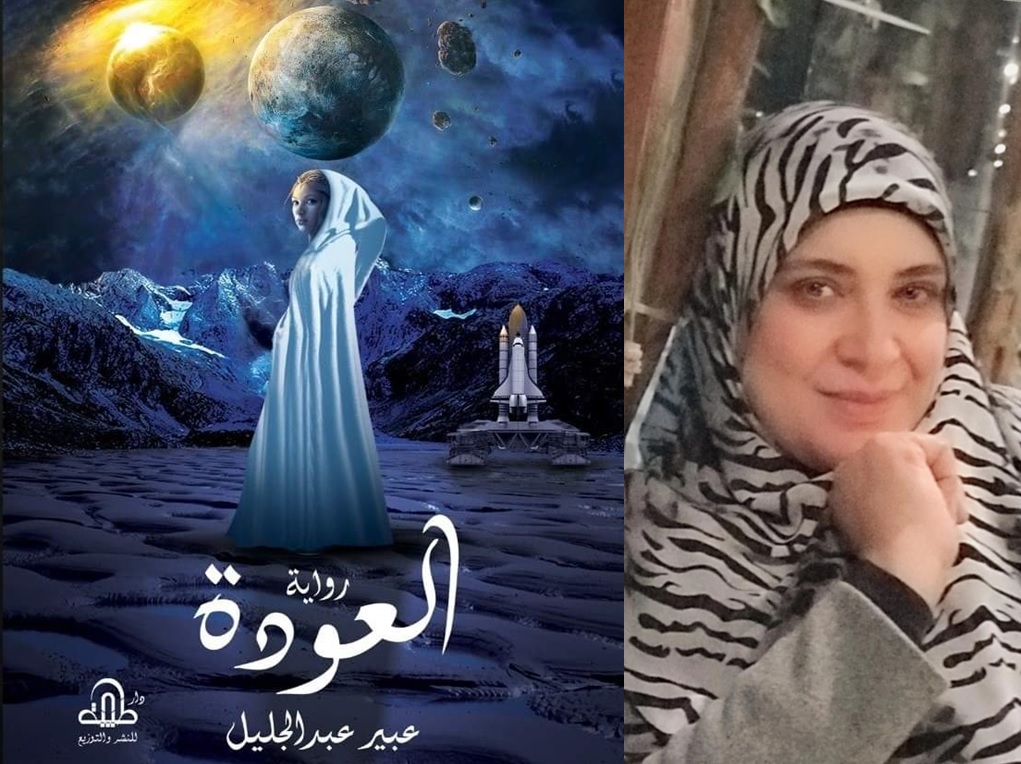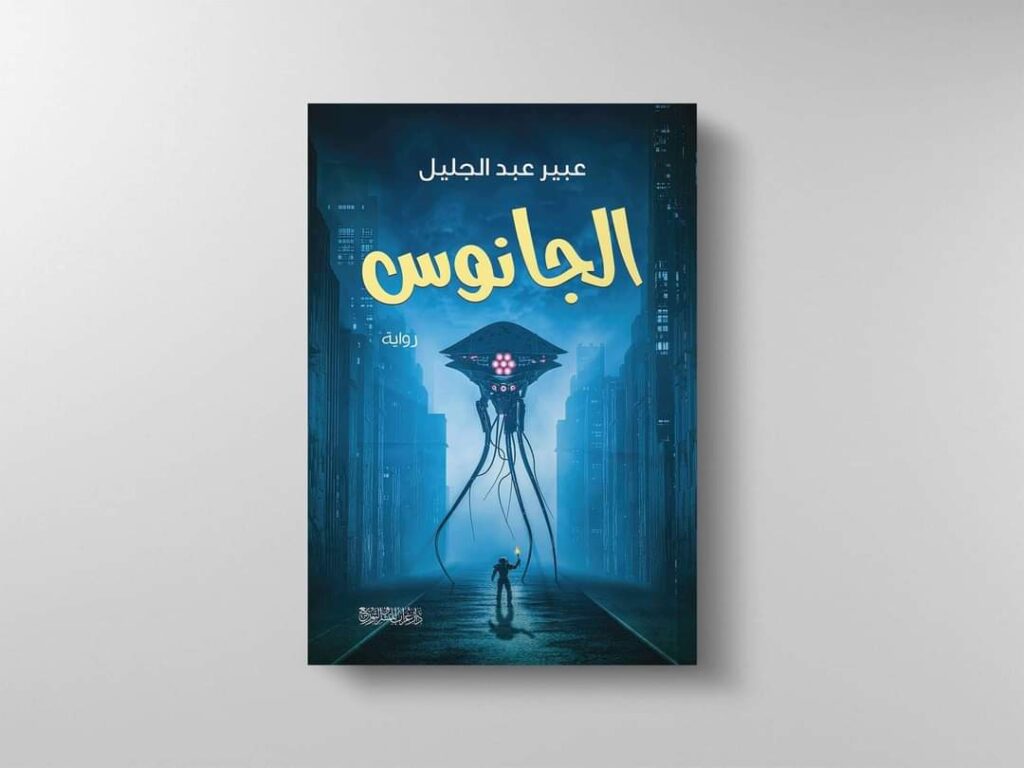
Abeer Abdel Galil has two novels in a series—‘The Return (العودة) and ‘Janus’ (الجانوس)—and a third installment in waiting. The Return begins with life on Earth being destroyed by a nuclear war, forcing humanity to migrate to the planet of Kablar. There, they become refugees but integrated into their society.
By Emad Aysha
“A writer’s true arsenal is not only his pen but everything and anything that waters his soul, heart, and mind from all the walks of literature and knowledge, and moments of introspection and analysis. They clear the fog inside our heads with a flashlight, and the pen is merely bleeding of all those lights ignited in our minds.”
What drew you to science fiction is your education and career.
“Growing up, I was a truthful reader. Not just books. I would look at the stars in the night sky when I was ten, a pleasure you can’t imagine. I can still remember all the maps of the stars and constellations in my head to this day. I was an introvert from the beginning.
I did not have too many friends growing up, but luckily, I never felt lonely. I had my grandmother, my parents, and my painstakingly compiled collection of books. And the sky above me.
My writing journey began with one book about President Sadat on my father’s bookshelf. I proposed writing a magazine review to my teacher titled How was the President killed despite all the protection? I was only 11 or 12, and I won’t tell you her reaction, but it set me on the right path of research into politics, conspiracies that lurk behind them, the kings of Europe, and the wars between Protestants and Catholics.
By the time I was 16, I had begun reading about Islam, and shortly afterward, I started reading about old herbal remedies. As for writing, I wrote poems in high school and even started a novel called Amina, drawing her picture in my notebook.”
Why did you start writing novels?
“As of 2014, a new stage began in my life, moving into human development and mental health from that point forward. I mainly specialize in ‘positive’ psychology. That year, I also got into fiction reading, beginning with Stephenie Meyer. That’s when I started watching science fiction movies too.
The Alchemist by Paulo Coelho triggered something. But writing science fiction came from all those studies of the paranormal and the rapid pace of technology in astrophysics. Space is the magic door we will all pass through, sooner or later. A future path for us shrouded in shadows, with only a tiny handful of us aware that we are being pulled by our noses towards a future not our own, to the edge and from there to our doom.
Known literary critic Khaled Gouda describes your novels as High and Epic Fantasy. Were you thinking of this while writing?
“Yes, I was thinking of it as both fantasy and epic science fiction, to the degree that the last word typed in my novel Janus is the term ‘epic.’ I made a concerted effort to think outside the box, if not break all the boxes imposed on us, so that we could spread our wings and build, find solutions, and persevere in the face of adversity without ever succumbing to hopelessness.
Where did you come up with the idea for (العودة)?
“At the time, I was writing my romantic social drama novel Ambience (عبق), which is interspersed with a little fantasy and paranormal, and by the time I reached the halfway point, I chanced upon a picture on a social media site for the Zona del Silencio or silent zone in Mexico. I read up on it, and an image began forming in my head of a place I call the ‘land of those who perish,’ making it the centerpiece of The Return. Here, not only are living things killed off, but even mechanoids stop working.
From that entrance point, the chain of inspiration began, augmented with research. I stopped writing my original novel and focused on The Return and Janus.”
Reading the novel, I was struck by how rational and cold the Kablarians are and how successful human scientists are because of their creativity and passion. Is this a description of Egyptians in the West, the brain drain (هجرة العقول)?
“It’s not just Egyptians, but the brain drains from the whole Arab world, with the exploitation of the finest minds coming out of Asia as well. Give people the resources and environment they need; there are no limits to how far they will excel, producing a nonstop juggernaut of progress. And you will know what will happen to you if you’re over there and suddenly stop being ‘productive.’
So, yes, that’s what I was doing in the story, tracking the migration of our minds, in some cases, forced migration.”
The Kablarian elders plan to invade another world and colonize it, killing many; are you referring to Western imperialism and Israeli occupation? And is ‘the return’ like the Palestinians returning?
Where can we retrieve our ideas if they are not threaded to reality with all their bitterness? Bittersweet, I should say, spun patiently into an expertly woven tapestry of prophecies that could come true despite their origins in the author's imagination. All hidden between the lines on the pages of my novel.
When we imagine, we often retell reality through a more fitting picture that the conscientious mind can accept, let alone the mind that is a blind follower.”

Your second novel (الجانوس) is the title of Janus, the two-faced god of the Romans.
“First, I chose the names of the different spacer races based on the names of constellations and the moons in our solar system, just to distinguish them from humanity. I considered the meanings of these names and how they serve the nature of people and places.
Janus comes from the Latin word for door or entrance and represents the departure point and next stage in a journey. Janus symbolizes transformation and oppositional sentiments, like good and evil, light and dark. The name is of an old Roman god who represents the beginning and end, representing transformation, circular motion, and continuous creation. He is a god of travel, roads, and the gates of cities and passageways.
He has two faces, two pairs of legs, and a dual body. One face represents the future, the other the past, representing tradition and eternity. He is also a god of conflict, driving people against each other and bringing peace.
Finally, what do you hope to accomplish by writing SF?
“If given the opportunity, SF can powerfully enhance and expand Arab awareness. The West uses SF to educate, prepare, and program the minds of all to absorb their thoughts without any resistance if not complete acceptance. Only conscientious minds can see this, and so shelter themselves.”






